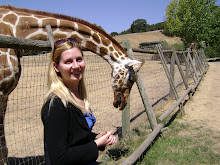Leslie Rule of KQED spoke with us about how this "gadget gal" noticed the learning tools of place-based education, and using community as text. Locative Media, location-based services, has applications for education. Android, by Google, had many of its features was location-based services. How can we make meaning in new ways with this technology? Leslie Rule spoke about one project in particular, which focused on the 1906 earthquake's 100 year anniversary. They recreated a time and a place across from City Hall; experience and place can change things. How does creating the content in place change the learning? I love the idea of getting learners outside the classroom where they can learn on so many levels. I remember how my students' perspectives changed about animals when a sanctuary brought some animals to the children. They had the opportunity to see and touch animals in person. It really reduced a lot of fears and changed some of their views of certain species.
Link:
http://www.locative-media.org/
Yana gave a presentation about Google Chrome, which is their new browser. Google started from scratch and wanted to improve browsers. It is very simple to use and the top tab works as a search and a url--now that's convenient. It is a nice tool with easy to use thumbnails. I think I still like Firefox the best, but who knows what they will do with these tools next.
A Whole New Mind was a surprisingly quick read. The book talked about how the previous decades belonged to the programmers, lawyers, and MBAs. However, times are changing and artists, inventors, designers, storytellers, caregivers, and consolers are sharing in society's happiness. Pink describes the right and left parts of the brain and how they differ from each other. Society has gone through historical stages which have empowered left brain thinkers, but right brain thinkers are just as important and are becoming appreciated. The right and left brain qualities are still under research and thinking has changed. The chapters go through different ages in history: the agricultural age (farmers), industrial age (factory workers), informational age (knowledge workers), and conceptual age (creators and empathizers). It sounds like the conceptual age will work well with my thinking. However, I still think teachers will remain underrated in our American society for many years to come. Additionally, I think that our pay will still be mediocre to our credentials. The brain functions are constantly being reevaluated and we need to continue studies of the brain before more conclusions are met. If the left hemisphere is sequential and the right hemisphere is simultaneous, then both selections can work with each other and people can be successful whether the right or left dominates their thinking. I agree with Pink that we need to become proficient in right-directed thinking and higher order thinking skills. I try to encourage my students to become proficient in these skills as well.
Subscribe to:
Post Comments (Atom)

1 comment:
Are you behind with the class work?
Post a Comment